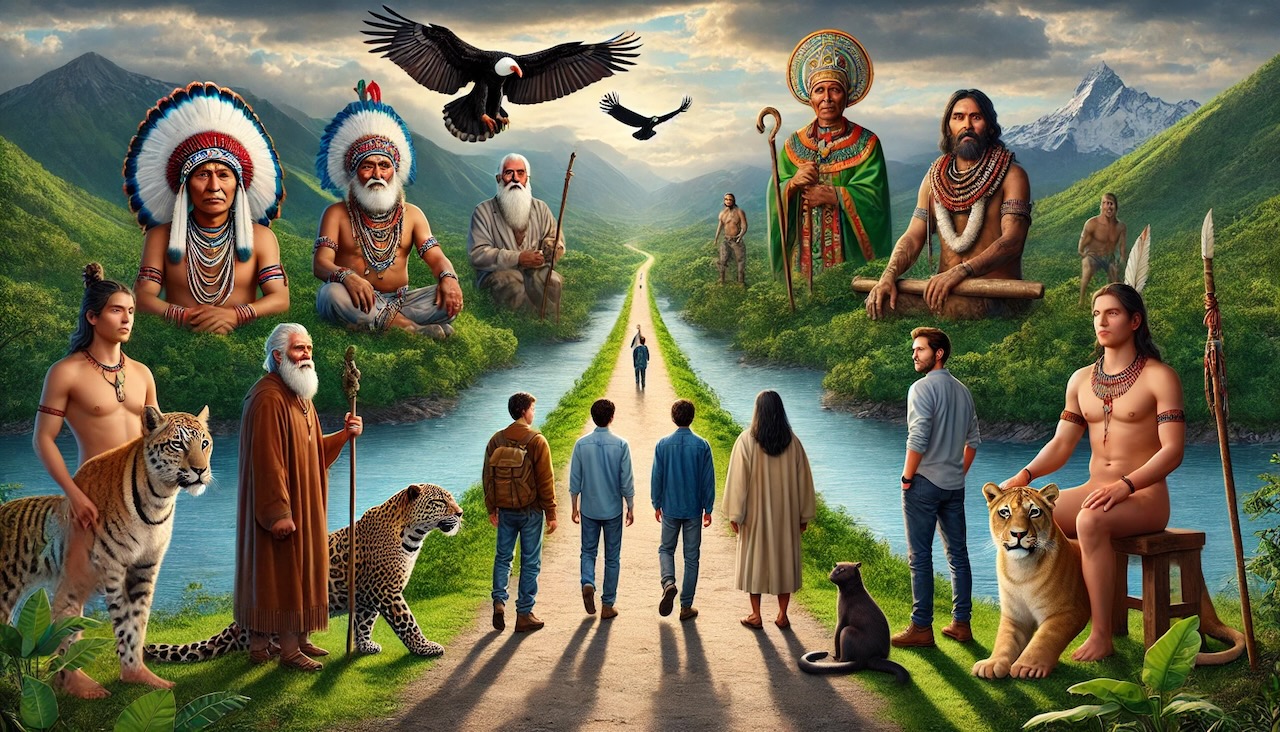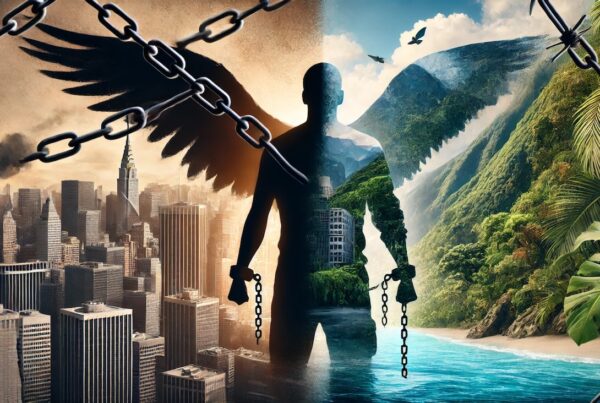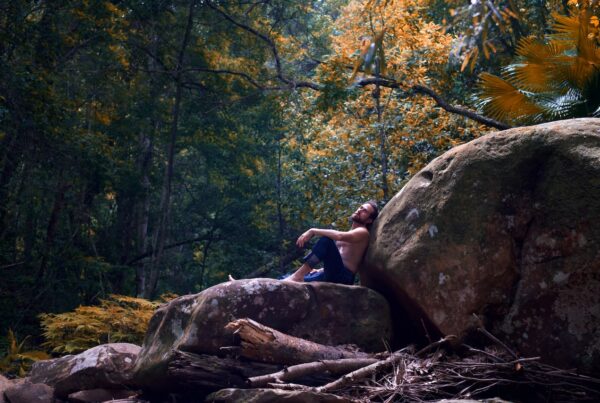Colonialism and the Crisis of Masculinity
The Role of Initiation and Elder Guidance
Highlights
- Men’s Initiations
- Global Conflicts
- Family Templating
- Intergenerational Trauma
- Where are the elders?
- Victim Consciousness
I remember when I was 13, my uncle took me to a torture chamber in the South of Lebanon—to view a slice of our history, not to be tortured that is! I was overwhelmed with shock, horror and sadness, but also left with confusion, curiosity and intrigue. I recall asking countless questions about what had happened to the people imprisoned there. Further, deep down, I pondered—what could possess a human to do this to another?
There is no lack of imagination when it comes to torture—the unthinkable becomes reality—but how did we get here as humans? If people can think themselves into situations like this, surely they can think themselves out, no? Moreover, how would a 13-year-old boy know, deep within his soul, that something felt… off? My inner moral compass was wildly trying to communicate something to me from a level I couldn’t quite understand yet.
Years being programmed to fear an enemy outside of myself, growing up with stories that a foreign invader is ready to create catastrophic damage at any minute, fear breathing through the cells in my body passed down from generations of atrocities. As I grew into my adolescence, these memories and stories eventually led me to a painful realization: the people capable of causing me the most pain were not foreign enemies armed with sophisticated weapons, but rather, my own parents.
Living a fragmented family life without a father and under the care of my single mother, who worked tirelessly to keep us alive, I became more and more rebellious as I moved through my teens. With age, the rebellious energy within me intensified, I played victim to my circumstances. My parents grew up with a victim consciousness, seeing the world as a place of oppressors versus the oppressed. This mindset was wired as their survival instincts and, ultimately, passed on to me, coded into my nervous system.
It took near-death experiences and a profound life initiation for me to begin to understand the nature of victim consciousness, how my nervous system was wired and how family templating shaped my worldview. Through this initiation—which lasted years, I began to understand the untempered energies and archetypal forces that had been driving my actions as a rebellious young man in this world. Initiation offered me a path to healing, not just for myself but for my family and ancestral line. It provided a structured way to confront and integrate these powerful forces, transforming them from sources of pain into profound wells of wisdom.
So how does my story tie into colonialism?
Recently, during the escalated conflict between Israel, its bombardment of Gaza, and its escalation with my home country of Lebanon, I have heard colonialism more often in the span of a few months than ever before. I’ve carefully observed the conflict, the stories, the outrage, listened to interviews, podcasts, read countless articles and sadly, I’ve heard nothing new. The same story I was born into as an Arab—the oppressor versus the oppressed—is playing out, again. My home village of Nabatieh is currently being bombed again as I write this article.
But now I have different eyes to observe the same conflict.
I often ponder, how can people in the world allow this to happen? How is it possible for our so called leaders to sit by and allow this to continue? At its root, it is mostly men making the decisions to invade, kill, occupy and repeat the cycle. And it is mostly men who are on the ground performing these atrocities or in an office ordering them.
Colonialism—the practice of acquiring political control over another country, occupying it with settlers and exploiting it economically, has left deep scars on the societies it has touched. One profound impact of colonialism is its disruption of initiation rites for young men and the crucial role of elders in guiding them through adolescence. The legacy of colonialism has contributed to a crisis in masculinity, characterized by untempered adolescent energies creating an imbalance of power and control.
Initiation rites have been a cornerstone in many traditional societies, marking the transition from boyhood to manhood. These rituals are transformative experiences that imbue young men with a sense of responsibility, purpose, belonging and deep connection to our human family and the natural world. Through initiation, young men learn the values, skills and knowledge necessary to contribute to their communities. They are also taught to channel their energies and desires constructively.
In many cultures, initiation rites are conducted under the guidance of elders—respected figures who have themselves undergone these rites, walked through the fires of life and play a crucial role in mentoring the youth, providing a stable and moral framework within which they can navigate the complexities of adulthood.
So where are the elders in modern society?
Colonial powers, driven by the motive of economic exploitation and cultural dominance, systematically dismantled traditional communal structures. Traditional education systems, including initiation rites, were often viewed as primitive and replaced with colonial education systems—often rewriting history. The elders, who held the knowledge and authority to conduct initiatory rites of passage, were marginalized, killed or assimilated into the colonial administrative machinery.
This disruption had far-reaching consequences. The absence of initiation rites left young men without the structured transition into adulthood that their ancestors had relied upon. Without elders to guide young men, they were left to navigate adolescence and adulthood on their own, leading to a gap in cultural continuity and moral guidance. I recall in Malidoma Some’s written account of his time under white settler school, that even the use of the word “ancestors” was forbidden entirely and use of the word warranted him a beating in his school.
The absence of initiation rites and elder guidance has led to significant issues that primarily circulate around untempered adolescent energies: seeking power, control, exploitation, dominance, an insatiable desire for more, never feeling or having enough—in essence, hallmarks of colonialism.
In traditional societies, these energies were harnessed and directed through initiation rites and the ongoing mentorship of elders. Some of these energies may have been personal, some ancestral and others communal and archetypal—but all were navigated within a held container of initiatory rites. Young men were taught how to control their impulses, manage their emotions and use their strengths for the benefit of the community.
The legacy of colonialism has created fractures that ripple through the individual and societal levels. Colonial administrations often established hierarchies that favored certain groups over others, creating systems of oppression that persist long after the end of colonial rule. This external imposition of power dynamics disrupted the traditional balance of power and control within communities.
On an individual level, the lack of initiatory rites coupled with the absence of elder guidance, these energies have manifested in destructive ways as evident in many post-colonial societies: unchecked aggression, delinquency, violence, drug and alcohol abuse, social unrest, acting out, acting in, self-harm, addictions of all kinds, consumerism, endless consumption, an inability to form healthy relationships and a sense of aimlessness have led young men into paths that are harmful to themselves and others.
Initiation: A Culture Making Practice
Restoring the role of elders and re-establishing initiation rites can be a powerful step towards addressing the crisis of masculinity in post-colonial societies. Elders provide mentorship and guidance, helping young men channel their energies constructively, to connect with their ancestral heritage, and instill a sense of responsibility and care for each other and our environment. Reintroducing initiation rites, adapted to contemporary contexts, offers structured transitions into adulthood, teaching valuable life skills, moral values, and the importance of community. This approach requires a multifaceted effort, involving families and local communities to create supportive environments.





